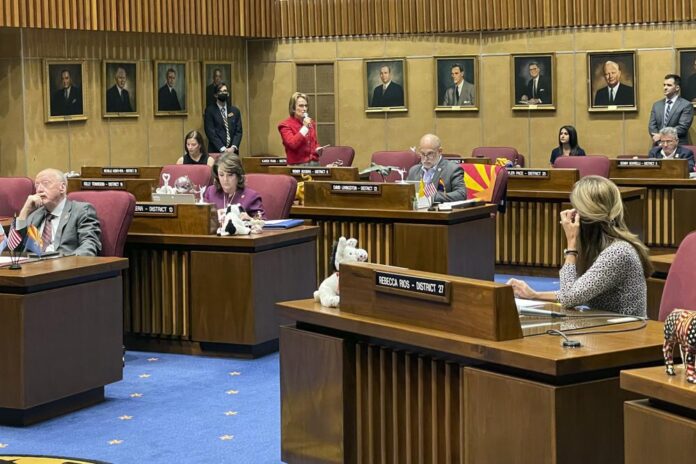
A judge dismissed Arizona state Sen. Wendy Rogers’ restraining order against a reporter Wednesday, saying that the investigative journalist’s conduct did not rise to the level of harassment.
“I don’t think there is a series of events directed at Sen. Rogers that would cause a reasonable person to be seriously alarmed, annoyed or harassed even if she, in fact, was,” Judge Howard Grodman said after a hearing in Flagstaff Justice Court. “The strongest point is investigative reporting is a legitimate purpose. lt just is.”
A different judge approved the Republican lawmaker’s request for an injunction last month against reporter Camryn Sanchez, sparking an outcry from journalists and First Amendment advocates. The hearing was held without any notice given to Sanchez.
Christopher Hennessy, the attorney representing Sanchez, said in a statement that the newspaper was pleased with the ruling.
“We stand firmly behind Ms. Sanchez and all our reporters in the exercise of their rights under the First Amendment, and we are pleased that the court recognized that this injunction was improper,” the statement said. “We look forward to continuing in our work reporting the news and are glad to put this issue behind us.”
Will Fischbach, the lawyer for Rogers, did not respond to phone and email messages seeking comment.
During the hearing, Fischbach had argued this was not a First Amendment case.
“Journalists go around knocking on doors asking questions, sure they do,” Fischbach said. “But this was an instance that Ms. Sanchez was told specifically not to have contact with Ms. Rogers at her desk.”
Hennessy accused Rogers of using an injunction as a tactic to keep Sanchez from doing her job.
“What Sen. Rogers decided to do is take something that is intended to be a shield and turned it into a weapon,” Hennessy said.
Dr. Joseph Russomanno, a journalism and mass communication professor at Arizona State University’s Cronkite School, said upholding Rogers’ injunction would have put journalists and basic news gathering in danger.
“The bigger picture here is thank goodness this ruling happened today,” Russomanno said. “There’s a reason we have the First Amendment and guaranteed freedom of the press. Is it carte blanche? No. There are reasonable restrictions. That was not happening at all in this situation.”
The senator filed a petition for an injunction after Sanchez, who covers the Senate for the Arizona Capitol Times, began investigating whether Rogers’ primary residence was in her legislative district.
The district encompasses a portion of northern Arizona, including Flagstaff. Financial disclosure forms state Rogers lives in a mobile home in Flagstaff. Sanchez found public property records indicating Rogers and her husband bought a home in the Phoenix suburb of Chandler in January, according to the newspaper. They also signed a trust document stating she lives in nearby Tempe.
Sanchez approached both Chandler and Tempe homes last month to inquire if Rogers or anyone in her family was present and to talk to neighbors.
Rogers cited the interactions and an instance in February when Sanchez approached her on the Senate floor with questions as evidence of harassment. It is common practice for journalists covering statehouses to go up to lawmakers on the floor. She claimed Sanchez had been verbally warned last year not to go up to her there.
Sanchez said in testimony that nobody gave her such a warning last year.
Based solely on Rogers’ testimony, a judge rejected banning Sanchez from the Senate but granted a request she stay away from Rogers’ homes for one year. At the time, the judge asked Rogers if she knew whether it was common practice for journalists to approach a person’s home.
Russomanno, the journalism professor, found that problematic.
“That the judge would place credibility in Sen. Rogers and her ability to determine what is a standard practice of journalism, which is in effect what the judge was asking her, it was ridiculous,” Russomanno said.
Rogers opted for an injunction rather than waiting to hold a hearing where Sanchez could be present.
“The idea here is for the person to learn their lesson and then leave the situation alone, correct?” Rogers told the judge at the time, according to audio from the hearing. “I assure you; we’ve tried to be diplomatic and reasonable up to this point. When someone comes to your house, that’s just over the top.”
Knocking on someone’s door if there’s no barrier or “no trespassing” sign is not unreasonable, said Judge Grodman, citing kids trick-or-treating and his own election campaigning as examples.
“You’re certainly free, Sen. Rogers, to advise anybody that they’re not welcome to your house,” Grodman said. “Then it becomes a criminal trespass. You can protect your home that way.”
Republished with the permission of The Associated Press.













